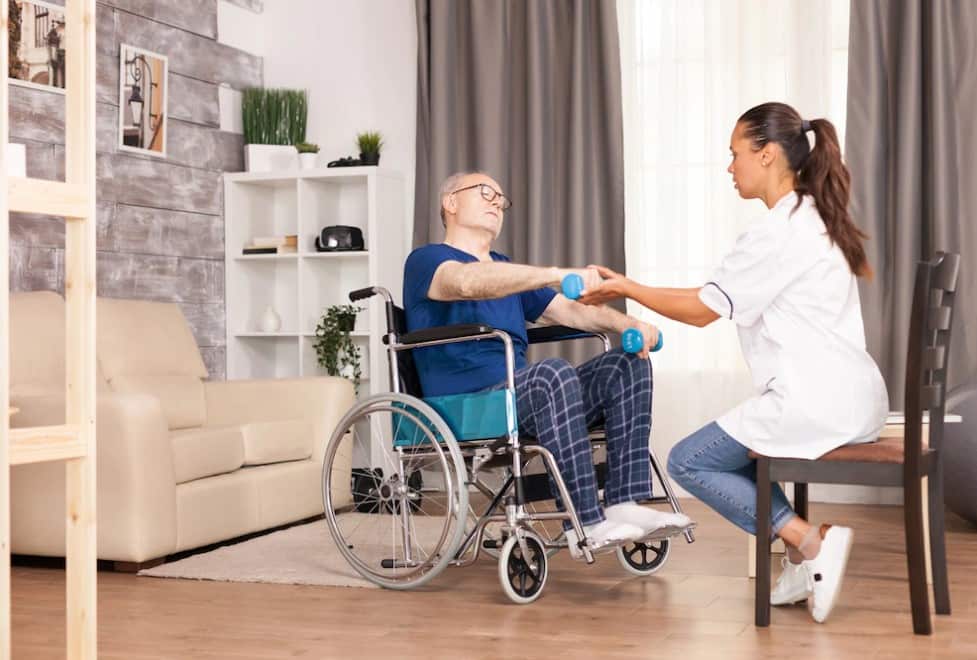A family’s guide to choosing the ideal ndis providers for loved ones
A family’s guide to choosing the ideal ndis providers for loved ones
Blog Article
The Importance of Special Needs Providers and the Impact of Home Care Providers
Special needs services are important for boosting the lives of people with impairments. They offer important assistance that cultivates freedom and health. Home treatment companies play an essential duty in this structure by supplying tailored assistance customized to distinct demands. This assistance not only benefits people yet likewise reduces the stress on household caretakers. Understanding these dynamics discloses a deeper link between community, treatment, and autonomy. What lies ahead for these critical solutions and their effect?
Recognizing Impairment Services
While several might not fully realize the intricacies of handicap services, they play a crucial function in boosting the top quality of life for individuals with impairments. These services encompass a broad array of assistance systems designed to help people in maneuvering everyday difficulties. From providing access to education and learning and job opportunity to facilitating health care and recovery, disability solutions intend to advertise independence and inclusion.Key components include instance management, advocacy, and assistive innovation, which aid people achieve individual goals. In addition, community-based programs usually promote social connections, lowering feelings of seclusion. Numerous organizations and federal government entities work together to ensure that people obtain customized support according to their one-of-a-kind demands. Understanding these services is essential, as they equip individuals with impairments to lead fulfilling lives, actively take part in their areas, and realize their potential. Inevitably, reliable disability solutions are foundational to advertising equity and access for all.

The Role of Home Care Providers
Home care providers play an important duty in providing customized assistance to individuals with disabilities, permitting them to maintain self-reliance in their own homes - ndis providers. These professionals provide a large range of solutions customized to satisfy the distinct demands of each individual, making certain that assistance is both efficient and pertinent. They assist with daily activities such as dish prep work, individual health, and drug monitoring, which are essential for improving the lifestyle for those they serve.Moreover, home treatment service providers function as a crucial link between individuals and their healthcare needs, promoting interaction with doctor and collaborating required solutions. Their presence additionally alleviates the problem on family members caregivers, advertising a healthier vibrant within households. By cultivating a risk-free and helpful environment, home treatment service providers empower people with specials needs to engage with their neighborhoods, pursue personal interests, and ultimately lead satisfying lives while staying in the convenience of their homes
Personalized Care and Support
Individualized care and assistance are essential components of reliable home care services, as they cater to the specific needs and preferences of each person with a handicap. Home care service providers assess the unique requirements of each client, creating tailored plans that prioritize their health, comfort, and health. This customized approach not just improves the quality of treatment however additionally promotes a sense of self-respect and respect.Caregivers are trained to adjust their methods, ensuring that solutions align with the customer's way of living, cultural history, and personal preferences. Routine interaction in between caretakers and clients aids to refine care strategies, resolving any changing requirements without delay. Additionally, the emphasis on individualized assistance encourages the development of count on and relationship, which can considerably improve the overall caregiving experience. Inevitably, personalized treatment and assistance equip individuals with specials needs to obtain the aid they require in a way that really feels considerate and verifying.
Enhancing Self-reliance for People
Enhancing freedom for people with specials needs is a basic objective within home care services. These solutions offer tailored support that empowers clients to participate in everyday tasks autonomously (ndis providers near me). By supplying support with individual care, mobility, and house jobs, home care providers enable people to keep a feeling of control over their lives. This freedom cultivates self-worth and durability, essential parts in the trip towards independence.Furthermore, home treatment services usually include skill-building opportunities that teach individuals flexible approaches, improving their ability to carry out tasks individually. This assistance not only meets prompt demands however also advertises lasting self-sufficiency. Furthermore, caretakers can aid in developing an atmosphere that suits private preferences and abilities, making sure that customers really feel comfortable and secure. On the whole, the emphasis on improving freedom with home treatment solutions is considerable in promoting dignity and lifestyle for individuals with handicaps
Building Neighborhood Inclusivity
While fostering individual freedom is necessary, building neighborhood inclusivity for individuals with impairments is just as vital. Inclusivity boosts social connections, permitting people to get involved fully in community life. Community involvement initiatives, such as recognition projects and inclusive visit here occasions, play a substantial function in breaking down obstacles and challenging misconceptions regarding disabilities.Accessible public areas and transportation options are essential parts that assist in engagement and assimilation. Partnership among local companies, companies, and advocacy teams can create supportive networks that urge inclusivity. Additionally, training neighborhood participants on impairment understanding promotes compassion and advertises a culture of acceptance.Ultimately, a comprehensive area not only advantages people with handicaps but improves the entire social fabric by accepting variety. By understanding and dealing with the distinct demands of individuals with impairments, communities can cultivate an environment where everybody has the opportunity to grow and contribute meaningfully.
The Impact on Families and Caregivers
Numerous households and caregivers of people with handicaps experience a profound influence on their every day lives and emotional wellness. The duties connected with caregiving can cause substantial physical and emotional pressure, typically resulting in caregiver fatigue. This can decrease their capability to offer effective assistance and create a nurturing setting. Additionally, the emotional toll can lead to feelings of seclusion and stress and anxiety, influencing family characteristics and relationships.Access to impairment solutions and home care companies can alleviate some Get More Info of these problems by supplying necessary assistance and resources. These solutions make it possible for family members to share caregiving duties, enabling caregivers to take breaks and focus by themselves wellness. Enhanced support networks promote a feeling of neighborhood, which can improve emotional strength. Eventually, the visibility of thorough impairment services especially influences families, promoting better health results and enhancing the quality of life for both caretakers and people with handicaps.
Future Patterns in Handicap Providers and Home Treatment
As the landscape of handicap solutions and home treatment progresses, technology combination is ending up being increasingly prominent. This change permits more customized assistance designs that deal with individual needs and preferences. By utilizing innovative devices, carriers can improve treatment high quality and improve outcomes for those they serve.
Innovation Integration in Care
The integration of modern technology in impairment solutions and home care is changing the method treatment is supplied and experienced. Advanced tools such as telehealth systems, wearable tools, and smart home systems enhance ease of access and communication in between caretakers and customers. These modern technologies promote real-time monitoring of wellness metrics, enabling prompt interventions and individualized treatment adjustments. Additionally, mobile applications equip people with impairments to manage their own care plans and gain access to sources much more efficiently. Automation and expert system are improving management tasks, maximizing caregivers to concentrate on supplying quality assistance. As modern technology remains to develop, its assimilation within these fields promises to boost outcomes, increase independence for customers, and maximize source allotment for carriers.
Personalized Support Models
While conventional care models commonly take on a one-size-fits-all technique, the future of impairment services and home treatment is significantly leaning towards customized support designs that accommodate the one-of-a-kind needs of each individual. These models stress partnership between treatment service providers, people, and their family members, ensuring that services align with individual preferences and particular obstacles. By leveraging assessments and feedback, providers can customize treatments, whether they involve daily living assistance, therapeutic activities, or emotional assistance. This personalized strategy not just boosts the quality of treatment however additionally promotes greater self-reliance and wellness amongst people with disabilities. As recognition of these benefits expands, customized support models are positioned to become the requirement in impairment services and home care, transforming the landscape of care distribution.
Frequently Asked Questions
What Qualifications Do Home Care Providers Commonly Need?
Home care carriers generally require a high college diploma or matching, conclusion of a state-approved training program, certification in mouth-to-mouth resuscitation and emergency treatment, and commonly a background check to ensure safety and security and credibility for clients.

Exactly How Are Impairment Solutions Moneyed and Accessed?
Impairment services are normally funded with federal government programs, private insurance coverage, and grants. Accessing these services frequently entails assessments, eligibility standards, and applications, which vary by place and particular demands of people looking for assistance.
Can Home Treatment Services Be Personalized for Details Disabilities?
Home care solutions can undoubtedly be personalized to fulfill the unique requirements of individuals with particular specials needs. This personalization allows for customized support, improving the high quality of treatment and enhancing the general health of customers.
What Prevail Challenges Dealt With by Home Care Providers?
Usual obstacles faced by home care carriers consist of staffing scarcities, poor training, communication barriers with family members and customers, differing levels of client demands, managing insurance coverage complexities, and guaranteeing consistent top quality you could try here of treatment throughout different environments.
How Can Families Locate Reputable Disability Solutions in Their Location?
Family members can locate dependable handicap services by investigating local agencies, seeking advice from on-line directory sites, looking for recommendations from healthcare experts, and linking with support system. Comprehensive assessments and interviews with service carriers assist ensure top quality and compatibility with demands. Personalized treatment and assistance are necessary parts of efficient home treatment services, as they provide to the specific demands and preferences of each individual with a handicap. By providing help with individual treatment, wheelchair, and household jobs, home treatment providers enable individuals to keep a feeling of control over their lives. The integration of modern technology in handicap services and home treatment is reinventing the method treatment is provided and experienced. While standard care designs usually adopt a one-size-fits-all approach, the future of impairment services and home treatment is progressively leaning in the direction of personalized support versions that cater to the distinct requirements of each individual. Home treatment solutions can indeed be tailored to satisfy the one-of-a-kind requirements of individuals with details disabilities.
Report this page